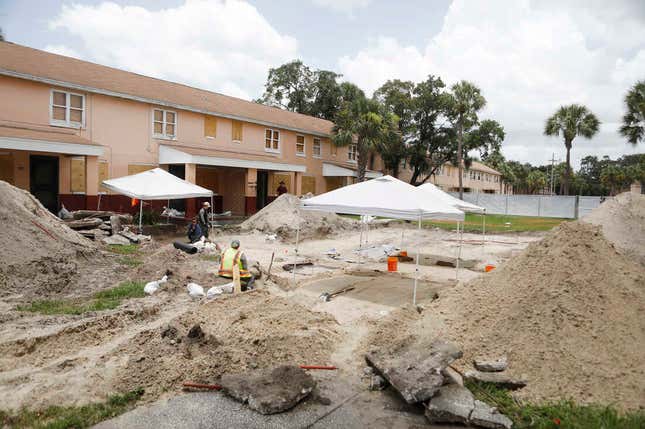
In Clearwater, Florida, hundreds of abandoned African American graves were found just outside of a downtown office building, according to NPR.
Surprising.
It is the fourth abandoned African American cemetery that has been found in Florida in the last couple of years, and they are shining a light onto some of the policies that negatively affected Black communities.
Unsurprising.
From NPR:
Barbara Sorey-Love has experienced some of that history firsthand. She was born in the basement of Clearwater’s hospital 69 years ago and grew up in Clearwater Heights, a neighborhood that no longer exists.
“Back then we were called colored,” she says. “That’s where the colored mothers and children were housed.”
Several years ago, Sorey-Love helped form the Clearwater Heights Reunion Committee, a group of people who grew up in the neighborhood before it became a victim of urban renewal. The group began asking questions about the old St. Matthews cemetery. It was closed in the mid-1950s and sold to developers who were supposed to move the graves to a new location.
Using ground-penetrating radar and later by excavating, archeologists found something many residents had suspected — most of the graves had never been moved.
Sorey-Love recently visited the excavation site, now an office building’s parking lot.
“I went over and looked in the burial site,” she says. “And it was like the skeleton was looking up at me saying, ‘Thank God you found me.’”
Even in death, the Black residents of Clearwater were being taken advantage of.
It is believed that there are hundreds of Black people buried underneath the parking lot and building that replaced the cemetery. Unfortunately, this is happening in multiple neighborhoods across Florida. In those cases, citizens are working with officials to see what can be done next.
Here’s NPR:
Just across the bay in Tampa, investigations conducted by the Tampa Bay Times helped uncover at least two more African American cemeteries that were abandoned and built over. Some of the graves are under the parking lot at Tropicana Field, home of the Tampa Bay Rays. Hundreds more were found at the site of a public housing complex.
In all these cases, Black residents were told the graves had been relocated.
“There were bodies still there and a large number of them,” says Antoinette Jackson, chair of the anthropology department at the University of South Florida. “That caught everybody’s attention.”
The cemeteries were all closed in the 1950s, as cities around Florida’s Tampa Bay began to grow rapidly in the post-war era. Property that had been developed and used by the Black community was taken for other uses and neighborhoods were wiped out by interstate exchanges. Jackson says the cemeteries were deliberately forgotten.
“Oftentimes,” she says, “we don’t use the word lost or abandoned. We are really saying erased, physically erased from the landscape for other purposes.”
City council records from the 1950s show that officials in Clearwater considered using road improvements as a way “to confine Negro home building and purchasing to the existing area,” according to NPR.
Jeff Moates, who worked on the Clearwater cemetery investigation with the Florida Public Archeology Network, says that some of the assessments imposed by the city were “used as a tactic to kind of isolate the African American community. There were certainly policies that further marginalized an already marginalized group of people,” per the story from NPR.
Sounds like manipulation and marginalization for another group’s gain.
Fortunately, the state legislature created a task force who will investigate and give recommendations to officials local and statewide.

